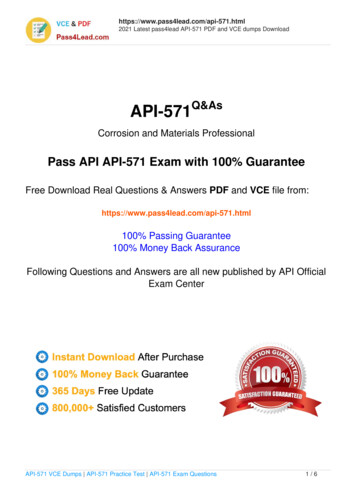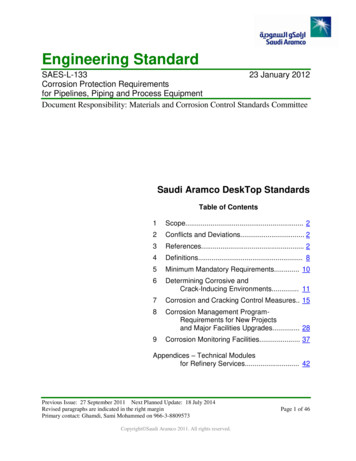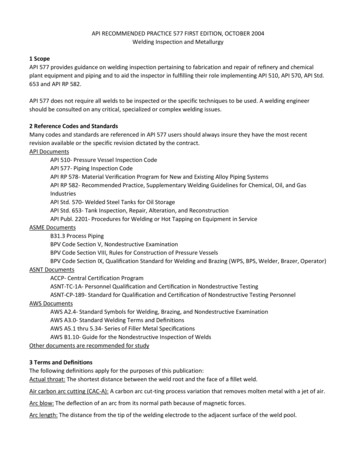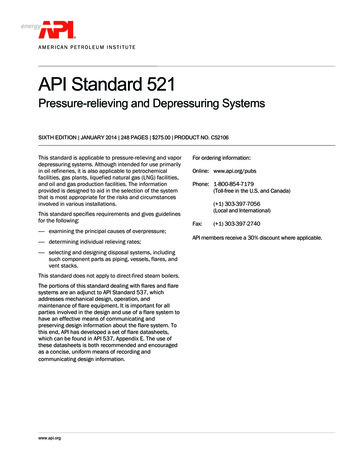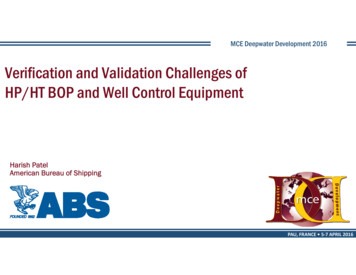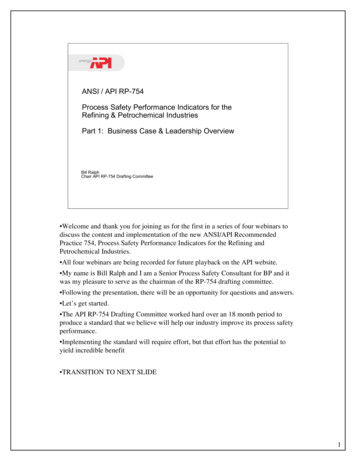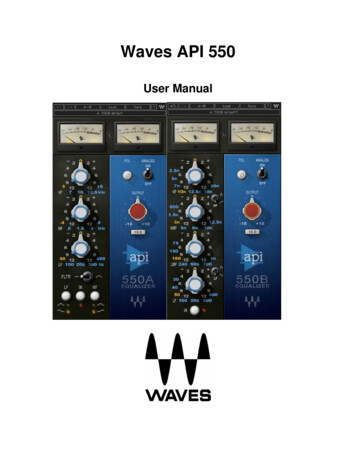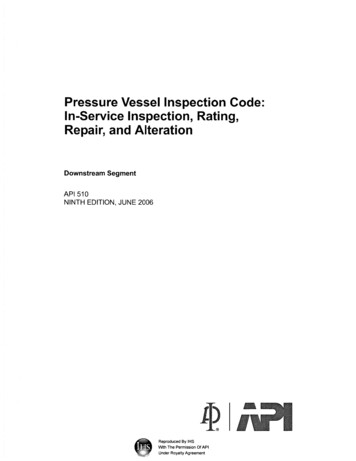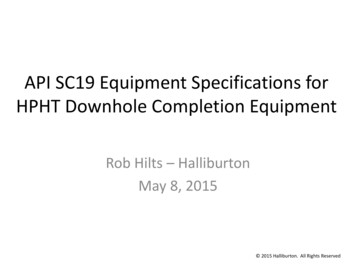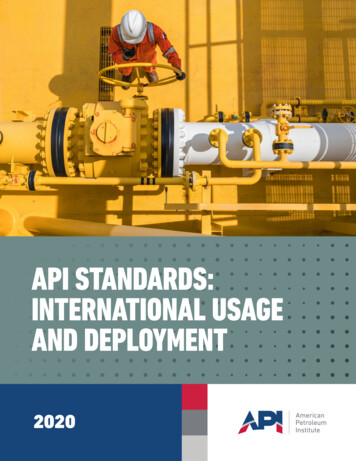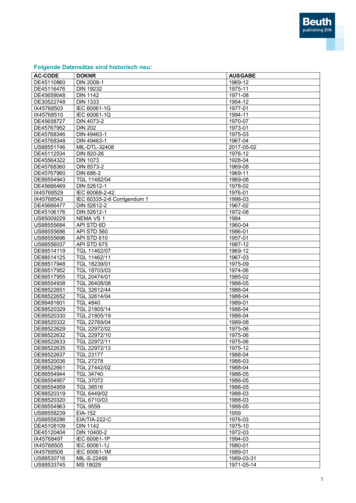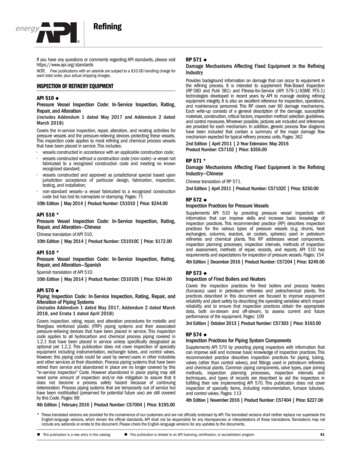
Transcription
RefiningIf you have any questions or comments regarding API standards, please visithttps://www.api.org/standardsNOTE Free publications with an asterisk are subject to a 10.00 handling charge foreach total order, plus actual shipping charges.INSPECTION OF REFINERY EQUIPMENTAPI 510 Pressure Vessel Inspection Code: In-Service Inspection, Rating,Repair, and Alteration(includes Addendum 1 dated May 2017 and Addendum 2 datedMarch 2018)Covers the in-service inspection, repair, alteration, and rerating activities forpressure vessels and the pressure-relieving devices protecting these vessels.This inspection code applies to most refining and chemical process vesselsthat have been placed in service. This includes: vessels constructed in accordance with an applicable construction code; vessels constructed without a construction code (non-code)—a vessel notfabricated to a recognized construction code and meeting no knownrecognized standard; vessels constructed and approved as jurisdictional special based uponjurisdiction acceptance of particular design, fabrication, inspection,testing, and installation; non-standard vessels—a vessel fabricated to a recognized constructioncode but has lost its nameplate or stamping. Pages: 7110th Edition May 2014 Product Number: C51010 Price: 244.00API 510 *Pressure Vessel Inspection Code: In-Service Inspection, Rating,Repair, and Alteration—ChineseChinese translation of API 510.10th Edition May 2014 Product Number: C51010C Price: 172.00API 510 *Pressure Vessel Inspection Code: In-Service Inspection, Rating,Repair, and Alteration—SpanishSpanish translation of API 510.10th Edition May 2014 Product Number: C51010S Price: 244.00API 570 Piping Inspection Code: In-Service Inspection, Rating, Repair, andAlteration of Piping Systems(includes Addendum 1 dated May 2017, Addendum 2 dated March2018, and Errata 1 dated April 2018)Covers inspection, rating, repair, and alteration procedures for metallic andfiberglass reinforced plastic (FRP) piping systems and their associatedpressure-relieving devices that have been placed in service. This inspectioncode applies to all hydrocarbon and chemical process piping covered in1.2.1 that have been placed in service unless specifically designated asoptional per 1.2.2. This publication does not cover inspection of specialtyequipment including instrumentation, exchanger tubes, and control valves.However, this piping code could be used by owner/users in other industriesand other services at their discretion. Process piping systems that have beenretired from service and abandoned in place are no longer covered by this“in-service inspection” Code. However abandoned in place piping may stillneed some amount of inspection and/or risk mitigation to assure that itdoes not become a process safety hazard because of continuingdeterioration. Process piping systems that are temporarily out of service buthave been mothballed (preserved for potential future use) are still coveredby this Code. Pages: 884th Edition February 2016 Product Number: C57004 Price: 195.00RP 571 Damage Mechanisms Affecting Fixed Equipment in the RefiningIndustryProvides background information on damage that can occur to equipment inthe refining process. It is intended to supplement Risk-Based Inspection(RP 580 and Publ 581) and Fitness-for-Service (API 579-1/ASME FFS-1)technologies developed in recent years by API to manage existing refiningequipment integrity. It is also an excellent reference for inspection, operations,and maintenance personnel. This RP covers over 60 damage mechanisms.Each write-up consists of a general description of the damage, susceptiblematerials, construction, critical factors, inspection method selection guidelines,and control measures. Wherever possible, pictures are included and referencesare provided for each mechanism. In addition, generic process flow diagramshave been included that contain a summary of the major damage flowmechanism expected for typical refinery process units. Pages: 3622nd Edition April 2011 2-Year Extension: May 2016Product Number: C57102 Price: 356.00RP 571 *Damage Mechanisms Affecting Fixed Equipment in the RefiningIndustry—ChineseChinese translation of RP 571.2nd Edition April 2011 Product Number: C57102C Price: 250.00RP 572 Inspection Practices for Pressure VesselsSupplements API 510 by providing pressure vessel inspectors withinformation that can improve skills and increase basic knowledge ofinspection practices. This recommended practice (RP) describes inspectionpractices for the various types of pressure vessels (e.g. drums, heatexchangers, columns, reactors, air coolers, spheres) used in petroleumrefineries and chemical plants. This RP addresses vessel components,inspection planning processes, inspection intervals, methods of inspectionand assessment, methods of repair, records, and reports. API 510 hasrequirements and expectations for inspection of pressure vessels. Pages: 1544th Edition December 2016 Product Number: C57204 Price: 249.00RP 573 Inspection of Fired Boilers and HeatersCovers the inspection practices for fired boilers and process heaters(furnaces) used in petroleum refineries and petrochemical plants. Thepractices described in this document are focused to improve equipmentreliability and plant safety by describing the operating variables which impactreliability and to ensure that inspection practices obtain the appropriatedata, both on-stream and off-stream, to assess current and futureperformance of the equipment. Pages: 1093rd Edition October 2013 Product Number: C57303 Price: 163.00RP 574 Inspection Practices for Piping System ComponentsSupplements API 570 by providing piping inspectors with information thatcan improve skill and increase basic knowledge of inspection practices. Thisrecommended practice describes inspection practices for piping, tubing,valves (other than control valves), and fittings used in petroleum refineriesand chemical plants. Common piping components, valve types, pipe joiningmethods, inspection planning processes, inspection intervals andtechniques, and types of records are described to aid the inspectors infulfilling their role implementing API 570. This publication does not coverinspection of specialty items, including instrumentation, furnace tubulars,and control valves. Pages: 1134th Edition November 2016 Product Number: C57404 Price: 227.00* These translated versions are provided for the convenience of our customers and are not officially endorsed by API. The translated versions shall neither replace nor supersede theEnglish-language versions, which remain the official standards. API shall not be responsible for any discrepancies or interpretations of these translations. Translations may notinclude any addenda or errata to the document. Please check the English-language versions for any updates to the documents. This publication is a new entry in this catalog. This publication is related to an API licensing, certification, or accreditation program.91
RefiningPhone Orders: 1 800 854 7179 (Toll-free: U.S. and Canada)Phone Orders: 1 303 397 7956 (Local and International)RP 575 Inspection Practices for Atmospheric and Low-Pressure Storage TanksRP 577 *Welding Processes, Inspection, and Metallurgy—ChineseCovers the inspection of atmospheric and low-pressure storage tanks thathave been designed to operate at pressures from atmospheric to 15 psig.Includes reasons for inspection, frequency and methods of inspection,methods of repair, and preparation of records and reports. Thisrecommended practice is intended to supplement Std 653, which covers theminimum requirements for maintaining the integrity of storage tanks afterthey have been placed in service. Pages: 963rd Edition April 2014 Product Number: C57503 Price: 206.00Chinese translation of RP 577.2nd Edition December 2013Product Number: C57702 CN1420 Price: 172.00RP 575 *Inspection Practices for Atmospheric and Low-Pressure StorageTanks—ChineseChinese translation of RP 575.3rd Edition April 2014 Product Number: C57503C Price: 144.00RP 576 Inspection of Pressure-Relieving DevicesDescribes the inspection and repair practices for self-actuated pressurerelieving devices commonly used in the oil/gas and petrochemical industries.As a guide to the inspection and repair of these devices in the user’s plant, it isintended to ensure their proper performance. This publication covers selfactuated devices such as direct acting spring loaded valves, pilot operatedpressure-relief valves, rupture disks, pin actuated devices, and weight-loadedpressure vacuum vents.The recommendations in this publication are not intended to supersederequirements established by regulatory bodies. This publication excludes tankweak seams and/or sections or tank thief hatches, explosion doors, fusibleplugs, control valves, pressure regulating devices, integral rotating equipmentcomponents, other devices that either depend on an external source of powerfor operation or are manually operated or devices not designed to beinspected or recertified. Inspections and tests made at manufacturers’ plants,which are usually covered by codes or purchase specifications, are not coveredby this publication.This publication does not cover training requirements for personnel involved inthe inspection and repair of pressure-relieving devices. Those seeking theserequirements should see API 510/570, which gives the requirements for aquality control system and specifies that the repair organization maintain anddocument a training program ensuring that personnel are qualified. Pages: 804th Edition April 2017 Product Number: C57604 Price: 227.00RP 576 *Inspection of Pressure-Relieving Devices—SpanishSpanish translation of RP 576.4th Edition April 2017 Product Number: C57604S Price: 227.00RP 577 Welding Processes, Inspection, and MetallurgyProvides guidance to the API authorized inspector on welding inspection asencountered with fabrication and repair of refinery and chemical plantequipment and piping. Common welding processes, welding procedures,welder qualifications, metallurgical effects from welding, and inspectiontechniques are described to aid the inspector in fulfilling their roleimplementing API 510, API 570, Std 653, and RP 582. The level of learningand training obtained from this document is not a replacement for thetraining and experience required to be an American Welding Society (AWS)Certified Welding Inspector (CWI). Pages: 1452nd Edition December 2013 Product Number: C57702 Price: 244.00RP 578 Guidelines for a Material Verification Program (MVP) for New andExisting AssetsProvides the guidelines for the owner/user to develop and implement amaterial verification program (MVP) as part of an asset integrity program. TheMVP uses positive material identification and other methods to verify that thenominal composition of an asset, an asset component, or weldment within thepressure envelope is consistent with the selected or specified constructionmaterials.A well-designed and implemented MVP is an important management systemused to minimize the potential for the release of hazardous substances due tononconforming materials of construction. Pages: 283rd Edition February 2018 Product Number: C57803 Price: 227.00API 579-1/ASME FFS-1Fitness-For-ServiceFitness-For-Service (FFS) assessments are quantitative engineeringevaluations that are performed to demonstrate the structural integrity of anin-service component that may contain a flaw or damage or that may beoperating under a specific condition that might cause a failure. This standardprovides guidance for conducting FFS assessments using methodologiesspecifically prepared for pressurized equipment.The guidelines provided in this standard can be used to make run-repairreplace decisions to help determine if components in pressurized equipmentcontaining flaws that have been identified by inspection can continue tooperate safely for some period of time. These FFS assessments are currentlyrecognized and referenced by the API Codes and Standards (510, 570, and653), and by NB-23 as suitable means for evaluating the structural integrityof pressure vessels, piping systems, and storage tanks where inspection hasrevealed degradation and flaws in the equipment. The methods andprocedures in this standard are intended to supplement and augment therequirements in API 510, API 570, Std 653, and other post-constructioncodes that reference FFS evaluations such as NB-23.The assessment procedures in this standard can be used for FFSassessments and/or rerating of equipment designed and constructed to thefollowing codes: (a) ASME B&PV Code, Section VIII, Division 1; (b) ASMEB&PV Code, Section VIII, Division 2; (c) ASME B&PV Code, Section I; (d)ASME B31.1 Piping Code; (e) ASME B31.3 Piping Code; (f) ASME B31.4Piping Code; (g) ASME B31.8 Piping Code; (h) ASME B31.12 Piping Code;(i) Std 650; (j) Std 620; and (k) Std 530. The assessment procedures inthis standard may also be applied to pressure-containing equipmentconstructed to other recognized codes and standards, including internationaland internal corporate standards.This standard has broad applications since the assessment procedures arebased on allowable stress methods and plastic collapse loads for non-cracklike flaws, and the Failure Assessment Diagram Approach for crack-like flaws.The FFS assessment procedures in this standard can be used to evaluateflaws commonly encountered in pressure vessels, piping, and tankage. Theprocedures are not intended to provide a definitive guideline for everypossible situation that may be encountered. However, flexibility is provided tothe user in the form of an advanced assessment level to handle uncommonsituations that may require a more detailed analysis.Copies may be purchased in hard copy, CD, or together for the prices listedbelow. Please note that the CD product is read-only and cann
implementing API 510, API 570, Std 653, and RP 582. The level of learning and training obtained from this document is not a replacement for the training and experience required to be an American Welding Society (AWS) Certified Welding Inspector (CWI). Pages: 145 2nd Edition December 2013 Product Number: C57702 Price: 244.00 RP 577 * Welding Processes, Inspection, and Metallurgy—Chinese .
